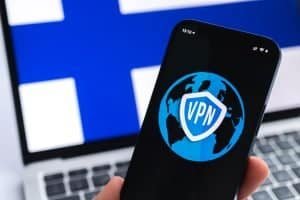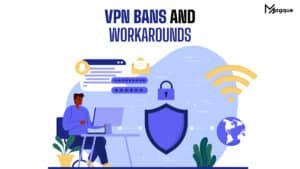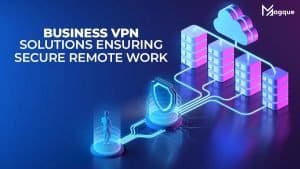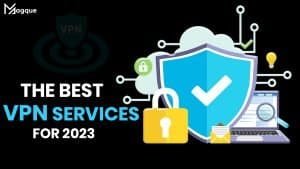The Ultimate Guide to VPNs and Online Privacy: Your Shield in the Digital World
In today’s hyper-connected world, safeguarding online privacy has never been more critical. With the constant threat of data breaches, cyberattacks, and invasive surveillance, it’s essential to take proactive measures to protect yourself while navigating the digital landscape. Enter VPNs – your trusty ally in the battle for online privacy.
What is a VPN, Anyway?
So, what exactly is a VPN? VPN stands for Virtual Private Network, and it’s like your online invisibility cloak. When you connect to a VPN, your internet traffic is encrypted and routed through a secure server, making it virtually impossible for anyone to snoop on your online activities. It’s like sending your data through a secret tunnel that shields it from prying eyes.
The Perplexity of Online Privacy
Online privacy can be a perplexing topic. We live in an age where our every move online is tracked, from the websites we visit to the products we purchase. Social media platforms, search engines, and advertisers collect vast amounts of data, creating a challenging digital footprint to erase.
But fear not, for VPNs are here to untangle this surveillance web. By masking your IP address and encrypting your data, VPNs add a layer of anonymity that leaves trackers scratching their heads. Your online activities become as enigmatic as a well-crafted mystery novel, and you regain control over your digital presence.
Bursting the Bubble of Geo-Restrictions
Have you ever tried to access a website or streaming service, only to be greeted with a message like, “This content is not available in your region”? Geo-restrictions are a common annoyance, but VPNs can burst this bubble effortlessly.
Connecting to a server in a different location lets you virtually teleport yourself anywhere. Want to access US Netflix from Europe? No problem. Need to bypass government censorship to access vital information? VPNs have got you covered.
Choosing the Right VPN Provider
Now that you’re sold on a VPN, the next step is selecting the right provider. With many options out there, it’s essential to make an informed choice. Look for a VPN service that offers:
- Robust Encryption: The best VPNs use military-grade encryption to secure your data.
- No-Logs Policy: A trustworthy VPN doesn’t maintain logs of your online activities, ensuring your privacy remains intact.
- High-Speed Servers: Slow internet speeds can be frustrating. Opt for a VPN with a vast network of fast servers.
- User-Friendly Interface: You don’t need to be a tech guru to use a VPN. Choose one with an intuitive interface.
Stay One Step Ahead with Online Privacy
In a world where information is power, protecting your online privacy is not an option; it’s a necessity. VPNs serve as your digital shield, safeguarding your personal information from prying eyes. Remember that staying informed and taking proactive steps towards online privacy is the key to a safer and more secure online experience.
So, make VPNs your trusted companion in the digital wilderness, whether you’re a digital nomad working from coffee shops, a passionate online shopper, or simply someone who values their privacy. Your online privacy deserves nothing less than the best.
In conclusion, VPNs are not just tools for tech enthusiasts; they are essential for anyone who values online privacy. With their ability to perplex trackers, burst through geo-restrictions, and keep your data secure, VPNs are necessary in today’s digital landscape. So, take the plunge, choose a reliable VPN provider, and take control of your online privacy today. Your digital life will never be the same again. And be sure to explore Magque, your go-to source for the latest and most intriguing updates in informative tips & reviews!
FAQs
Q1. What is a VPN, and how does it work?
A VPN, or Virtual Private Network, is a technology that creates a secure and encrypted connection between your device (such as a computer or smartphone) and a remote server operated by the VPN service provider. This connection helps to protect your online privacy by masking your IP address and encrypting your data, making it difficult for hackers, ISPs, or government agencies to monitor your online activities.
Q2. Are VPNs legal to use?
Yes, VPNs are legal in most countries, including the United States and many European countries. However, the legality of VPN usage may vary from one region to another. It’s essential to check your local laws and regulations regarding VPNs, as some countries may have restrictions or limitations.
Q3. Can a VPN make me completely anonymous online?
While VPNs provide significant anonymity and privacy protection, they don’t make you completely anonymous. Your VPN provider may access some of your data, and websites you visit may still collect information through cookies and other tracking mechanisms. Combining VPN use with good online privacy practices, such as using secure and private search engines, avoiding public Wi-Fi for sensitive activities, and regularly clearing your browser cache and cookies, is crucial.
Q4. How do I choose the exemplary VPN service for me?
Choosing the exemplary VPN service depends on your specific needs and preferences. Factors to consider include the provider’s reputation, logging policy (ideally, look for a no-logs policy), server locations, connection speed, device compatibility, and customer support. It’s also essential to evaluate whether the VPN can bypass geo-restrictions if that’s a requirement for you.
Q5. Are free VPNs as good as paid ones?
Free VPNs can be tempting but often have limitations and risks. Many free VPN providers may log your data or display ads, potentially compromising your privacy. Paid VPN services typically offer more robust security features, faster speeds, and better customer support. Suppose online privacy and security are a priority. In that case, investing in a reputable paid VPN service is generally advisable rather than relying on a free one.
Read Also This:- The Importance of VPNs for Remote Work













